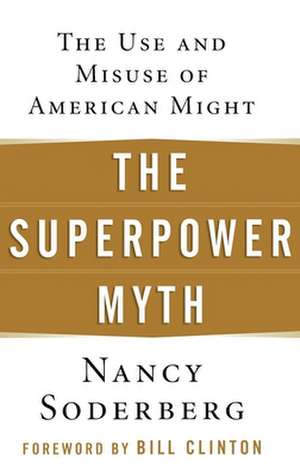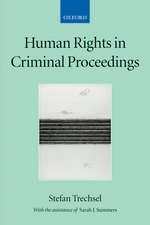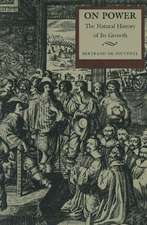The Superpower Myth: The Use and Misuse of American Might
Autor Nancy E. Soderbergen Limba Engleză Hardback – 10 mar 2005
| Toate formatele și edițiile | Preț | Express |
|---|---|---|
| Paperback (1) | 103.73 lei 3-5 săpt. | |
| Wiley – 8 iun 2006 | 103.73 lei 3-5 săpt. | |
| Hardback (1) | 228.28 lei 3-5 săpt. | |
| Wiley (TP) – 10 mar 2005 | 228.28 lei 3-5 săpt. |
Preț: 228.28 lei
Nou
43.69€ • 45.22$ • 36.93£
Carte disponibilă
Livrare economică 13-27 februarie
Specificații
ISBN-10: 0471656836
Pagini: 404
Dimensiuni: 163 x 236 x 30 mm
Greutate: 0.75 kg
Editura: Wiley (TP)
Locul publicării:Hoboken, United States
Descriere
Textul de pe ultima copertă
"What America can--and cannot--accomplish purely on its own has become the central question of U.S. foreign policy. Nancy Soderberg offers a sensible, hard-headed, realistic alternative to the excesses of America's Iraq-era dealings with the world."
--James Fallows, National Correspondent The Atlantic Monthly
"Both a memoir and analysis, this fascinating account by a White House insider tells how to marshal the full strength of American power beyond our unrivalled military."
--Joseph S. Nye Jr., author of Soft Power: The Means to Success in World Politics
"In The Superpower Myth, Nancy Soderberg tackles the most important question the United States has faced since the end of the cold war: how and to what end do we use our military and economic supremacy? Her argument shows, among other things, how George W. Bush ignored the answers that the Clinton administration had begun to develop to this question. She provides a very useful memoir of the Clinton years and a compelling critique of the Bush administration."
--John B. Judis, Senior Editor, The New Republic and author of The Folly of Empire
"For eight years, Nancy Soderberg served with distinction and creativity at the highest levels of American government. She is uniquely positioned to explain how the world works in this new era--and when it's in danger of breaking down."
--Dr. Madeleine Albright, former U.S. Secretary of State
"The Superpower Myth exposes the essential fallacy of those who believe that because America is the most powerful country in the world, it can go about its business without regard for the views of others. Soderberg's argument that we must engage the world in concert with others speaks to an essential truth that we ignore at our own peril."
--Ivo H. Daalder, coauthor of America Unbound
Cuprins
Recenzii
"... some interesting moments". ( Kirkus Reviews , December 1, 2004)









